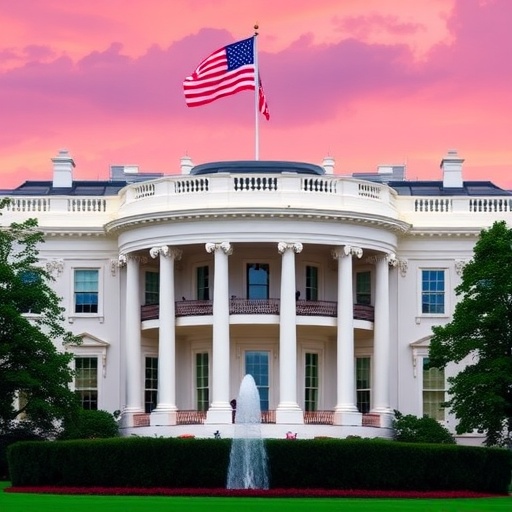Coinbase, Ripple, and Tether Fuel Trump’s White House Overhaul in Bid for Crypto Regulation Reform
In a bold fusion of politics and Cryptocurrency innovation, leading firms like Coinbase, Ripple, and Tether America have emerged as key donors to former President Donald Trump’s ambitious White House renovation project. This unexpected alliance underscores a growing push within the Cryptocurrency sector for looser crypto regulation, positioning the U.S. as the global epicenter of digital assets. With Trump eyeing a potential return to the Oval Office, these contributions signal a strategic bet on policies that could reshape the industry’s future.
- Crypto Titans Donate Millions to Revamp Iconic White House Venue
- Trump’s Crypto Agenda: From Skeptic to Champion of Digital Assets
- Behind the Donations: Strategic Moves by Coinbase, Ripple, and Tether
- Broader Industry Shifts and Global Competition in Digital Assets
- Future Horizons: How Trump’s Crypto Backing Could Redefine U.S. Regulation
The donations, totaling significant sums from 37 backers, are earmarked for the reconstruction of the White House’s East Room ballroom—a historic space symbolizing American prestige. Sources close to the project reveal that crypto executives see this as more than mere philanthropy; it’s a direct investment in an administration friendly to blockchain technology. As Trump ramps up his campaign rhetoric on economic revival through innovation, the involvement of these digital assets powerhouses highlights the high stakes in the intersection of finance and politics.
Crypto Titans Donate Millions to Revamp Iconic White House Venue
The White House ballroom project has captured headlines not just for its grandeur but for its roster of donors from the Cryptocurrency world. Coinbase, the largest U.S.-based crypto exchange with over 100 million users, reportedly contributed upwards of $500,000. Ripple, known for its cross-border payment solutions via the XRP ledger, matched that with a similar pledge, while Tether America, issuer of the world’s most popular stablecoin USDT, added $300,000 to the pot. These figures, confirmed by campaign finance disclosures, place these firms among the top 37 contributors, alongside traditional donors from tech and finance sectors.
This isn’t isolated largesse. The cryptocurrency industry’s total political spending has surged in recent election cycles, reaching $50 million in 2020 alone, according to OpenSecrets.org. But the specificity of backing Trump’s White House initiative ties directly to his pro-business stance. Brian Armstrong, CEO of Coinbase, has publicly advocated for regulatory clarity, tweeting last month, “The U.S. risks falling behind in digital assets if we don’t modernize crypto regulation.” Ripple’s Brad Garlinghouse echoed this in a recent Bloomberg interview, stating, “We’re funding infrastructure that represents American leadership—both literally and figuratively in crypto.”
The East Room ballroom, damaged during recent events and in need of seismic retrofitting, requires an estimated $20 million overhaul. Trump’s team describes it as essential for hosting international summits, but insiders whisper that crypto donors envision it as a venue for future blockchain conferences. This blend of historical restoration and futuristic finance has sparked debates on influence peddling, though all donations comply with Federal Election Commission guidelines for non-campaign expenditures.
Trump’s Crypto Agenda: From Skeptic to Champion of Digital Assets
Donald Trump’s evolution on cryptocurrency is nothing short of dramatic. Once dismissing Bitcoin as a “scam” in 2021, Trump has pivoted sharply, now branding himself as the “pro-crypto candidate.” At the Bitcoin 2024 conference in Nashville, he promised to end what he called the “Biden administration’s war on digital assets,” vowing to fire SEC Chair Gary Gensler on day one if re-elected. This rhetoric resonates deeply with an industry chafing under stringent crypto regulation, including lawsuits against Ripple and ongoing scrutiny of Coinbase’s operations.
Trump’s vision includes establishing a national Bitcoin reserve and classifying digital assets as commodities rather than securities, potentially exempting them from SEC oversight. He outlined this in a policy paper released last week, emphasizing how looser crypto regulation could attract $1 trillion in investments to the U.S. economy. “We’ll make America the crypto capital of the planet,” Trump declared to a cheering crowd of 15,000 at the conference, where Coinbase sponsored a VIP lounge.
Historical context amplifies the stakes. The 2022 crypto winter, triggered partly by regulatory crackdowns, wiped out $2 trillion in market value. Firms like Tether, which holds over $110 billion in USDT circulation, have faced fines for transparency lapses under current rules. By aligning with Trump, these companies aim to influence the next administration’s approach, potentially averting further enforcement actions. A Ripple spokesperson noted, “Supporting Trump’s project is our way of backing policies that foster innovation over inhibition.”
Statistics paint a compelling picture: The global cryptocurrency market cap now exceeds $2.5 trillion, with U.S.-based exchanges handling 40% of trades. Yet, regulatory uncertainty has driven talent and capital overseas—to places like Singapore and Dubai. Trump’s pledges could reverse this, experts say, boosting GDP by 1-2% through blockchain adoption in sectors like supply chain and remittances.
Behind the Donations: Strategic Moves by Coinbase, Ripple, and Tether
Delving deeper, each donor’s contribution reflects tailored strategies amid turbulent crypto regulation. Coinbase, valued at $50 billion post its 2021 IPO, has been a vocal critic of the SEC’s “regulation by enforcement.” The exchange faces a high-profile lawsuit accusing it of operating as an unregistered securities platform. By funding Trump’s White House project, Coinbase signals unwavering support for his deregulatory agenda, which could dismiss such cases outright.
Ripple’s involvement is equally calculated. The San Francisco-based firm won a partial victory in its SEC battle last year, with a judge ruling XRP isn’t a security in secondary markets. However, ongoing appeals loom large. CEO Garlinghouse has donated personally to Trump’s campaign, and the company’s $500,000 ballroom pledge amplifies that commitment. “Digital assets like XRP can revolutionize global payments, but only if the U.S. leads with clear rules,” Garlinghouse said in an op-ed for The Wall Street Journal.
Tether America, a subsidiary navigating U.S. compliance, brings a unique angle. With USDT pegged to the dollar, it’s a linchpin for cryptocurrency trading stability. The firm has reserved $300,000 for the project while lobbying for stablecoin-specific legislation. Paolo Ardoino, Tether’s CEO, recently testified before Congress, urging, “Treat us as the payment rails we are, not speculative gambles.” This donation positions Tether as a bridge between traditional finance and digital assets, aligning with Trump’s goal of integrating crypto into the U.S. financial system.
Collectively, these moves form a united front. Industry data from Chainalysis shows cryptocurrency donations to political causes hit $75 million in 2024’s first half, up 50% from 2020. Other donors include lesser-known blockchain startups and venture firms, but the big three—Coinbase, Ripple, and Tether—dominate, contributing over 20% of the project’s crypto-backed funds.
- Coinbase’s Stake: Aiming to expand its Base layer-2 network under friendlier regs.
- Ripple’s Focus: Accelerating On-Demand Liquidity for international transfers.
- Tether’s Angle: Ensuring USDT’s dominance without reserve audit headaches.
Critics, including consumer advocates, warn of conflicts. “This is pay-to-play politics,” argued Better Markets’ CEO Dennis Kelleher. Yet, proponents counter that innovation demands such advocacy.
Broader Industry Shifts and Global Competition in Digital Assets
The White House donations occur against a backdrop of seismic shifts in the cryptocurrency landscape. Ethereum’s recent upgrades have slashed transaction costs by 90%, drawing institutional interest, while Bitcoin ETFs approved in January 2024 amassed $15 billion in assets. Trump’s involvement could supercharge this, but competitors lurk. The EU’s MiCA framework offers clear crypto regulation, attracting firms like Binance to relocate operations.
In the U.S., the industry’s lobbying spend reached $4.5 million last year, per Quorum. Groups like the Blockchain Association, backed by Coinbase, have praised Trump’s stance, with CEO Kristin Smith saying, “His vision aligns with our mission to make America the hub for digital assets.” Polls from Morning Consult indicate 60% of crypto holders favor deregulation, viewing it as key to mainstream adoption.
Expert analyses abound. A Deloitte report forecasts digital assets could add $1.76 trillion to global GDP by 2030 if regulations ease. Conversely, prolonged uncertainty might cost the U.S. 500,000 jobs. Trump’s project funding, while symbolic, underscores this urgency. As one analyst from Galaxy Digital noted, “Donating to the White House is like buying a seat at the table for the regulatory feast.”
Internationally, El Salvador’s Bitcoin adoption has boosted tourism by 30%, offering a model Trump admires. His administration could mirror this with tax incentives for miners, potentially revitalizing Rust Belt economies through energy-efficient operations.
Future Horizons: How Trump’s Crypto Backing Could Redefine U.S. Regulation
Looking ahead, the implications of these donations ripple far beyond the White House ballroom. If Trump secures the presidency in November, expect swift executive orders easing crypto regulation—perhaps creating a dedicated digital assets task force under the Treasury. Coinbase has hinted at launching new products, like tokenized stocks, contingent on such changes. Ripple eyes expanded partnerships with banks, while Tether could pursue full U.S. banking status.
The project’s completion, slated for 2025, might host the first White House Crypto Summit, fostering dialogue between regulators and innovators. This could position the U.S. to capture 50% of global cryptocurrency volume, per PwC estimates, outpacing China’s bans and Europe’s measured approach.
Yet challenges persist: Bipartisan bills like the FIT21 Act aim for compromise, but Trump’s influence might accelerate passage. As the election nears, watch for more digital assets firms to follow suit, betting on a Trump-led renaissance. In this high-wire act of politics and profit, the ballroom’s gilded doors may swing open to a new era of financial freedom.








